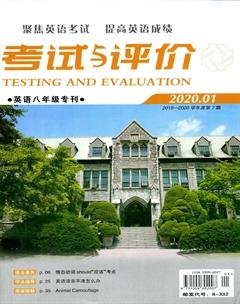Unit 1词汇要点讲解
李紫薇
1. matter n. 问题;事情 vi. 要緊;有关系
matter为可数名词,意为“问题, 事情”,通常用于句型“Whats the matter (with sb.)?”
同义句有“Whats wrong (with sb.)?”和“Whats the trouble (with sb.)?”
—Whats the matter with him? 他怎么了?
—He has a headache. 他头痛。
【拓展】 matter还可作不及物动词,意为“要紧,有关系”,主要用于否定句、疑问句或条件句中。
It doesnt matter. 没有关系。
【温馨提示】 wrong为形容词,其前不能加the。
2. trouble n. 麻烦;烦恼 vt. 麻烦 vi. 烦恼
have trouble with sth. 表示“有病痛,因……苦恼;在某方面有麻烦”,后面习惯接名词、代词或名词性短语。
She is having trouble with her teeth. 她牙齿痛。
He has some trouble with his English pronunciation. 他的英语发音有问题。
【拓展】 have trouble (in) doing sth. 表示“在做某事方面有困难、费事”,后面习惯接动名词作宾语。
I have some trouble (in) reading the letter, for his handwriting is very bad. 我读这封信很困难, 因为他的书写很差。
3. stomach n. 胃
He woke up with a pain in his stomach. 他醒来时感觉肚子疼。
stomachache也是名词,意为“腹痛,肚子痛;胃痛”。
She had a stomachache and asked to be excused. 她肚子疼,请求离开一下。
【拓展】表示身体部位的名词加上名词ache (疼痛),可以构成合成名词。如:headache头痛;toothache 牙痛;earache 耳朵痛。另外,sore throat 喉咙痛;neck pain 脖子痛。
4. lie v. 躺;坐落在;处于……状态;说谎 n. 谎言;谎话;状态;位置
The driver saw an old man lying on the side of the road. 司机看到一位老人躺在路边。
Thats a lie! 你说谎!
They thought the boys told lies about that thing. 他们认为男孩们在那件事上撒了谎。
【拓展】 第三人称单数现在时:lies;现在分词:lying;过去分词:lay;过去时:lain
5. sick adj. (身体或精神)生病的;有病的;不适的
Look at that sick boy. He is very sick. 看看那个生病的男孩,他病得很重。
【拓展】 ill 表示“生病的;有病的”,一般作表语,不作定语;而sick 既可以作表语又可以作定语,如“病人”可以说a sick man或the sick,而ill不可。
She is ill / sick in bed. 她卧病在床。
She is looking after her sick father. 她在照顾她生病的父亲。
6. death n. 死;死亡
His father is drinking himself to death. 他的爸爸这样喝酒非醉死不可。
【拓展】 death, die, dead, dying
(1) death n. 是抽象名词,可作主语或宾语。
His death is weightier than Mount Tai. 他的死比泰山还要重。
I heard of his death when I got to his house. 我到他家时得知他已经去世了。
(2) die v. 死亡,死去
He was born in 1947 and died two years ago. 他生于1947年,死于两年前。
【温馨提示】 die表示瞬间动作,不与表示一段时间的状语连用。
那位伟大的人物去世十年了。
误:That great man has died for ten years.
正:That great man has been dead for ten years.
正:That great man died ten years ago.
(3) dead adj. 表示状态,可以在句中作表语和定语。
He is dead, but his name will live for ever in our hearts. 他虽然死了,但他的名字将永远留在我们心中。
It doesnt look like a dead fox. 看来它不像一只死狐狸。
(4) dying adj. 表示“生命垂危的”。
His good friend called that his grandma was dying. 他的朋友打電话来,说他的奶奶奄奄一息了。
7. to ones surprise 使某人惊讶的是;出乎某人的意料
But to his surprise, they all agreed to go with him. 但出乎他的意料,他们都同意和他一起去。
【拓展】类似的固定结构:to ones joy 使某人高兴的是;to ones disappointment 令某人失望的是;to ones satisfaction 令某人满意的是
8. thanks to 多亏;由于;因为
Thanks to Mr. Wang and the passengers, the man was saved by the doctors in time. 多亏了王先生和乘客们,医生及时挽救了老人的生命。
【拓展】 thanks for表示“因……而感谢”,其中的thanks为复数名词,介词for指原因,后接名词、代词或V-ing形式。
Thanks for your help. 谢谢你的帮助。
Thanks for inviting me. 谢谢你对我的邀请。
9. be used to 习惯于……;适应于……
be used to后接名词、代词或V-ing形式。
As a mountain climber, Aron is used to taking risks. 作为一名登山者,阿伦习惯于冒险。
【辨析】 used to do表示“过去常常做某事”,其一般疑问句和否定句的构成方法要注意。
Used he to get up early?
= Did he use to get up early? 他过去常常早起吗?
He used to smoke, didnt he? 他以前抽烟,是吗?
He used not to get up early.
= He usednt to get up early.
= He didnt use to get up early. 他过去不早起。
10. so that以便,为了
so that引导目的状语从句,从句中的谓语动词通常和may / might, can / could等情态动词连用。
We got up early so that we could catch the early bus. 为了能赶上早班车,我们早就起床了。
【拓展】 (1) so... that...引导结果状语从句,意为“如此……以至于……”,常用句型为:主语+谓语+so+adj. / adv.+that从句。
His love for mountain climbing is so great that he kept on climbing mountains even after this experience. 他对登山如此酷爱,以至于即使这次经历之后,他还是继续登山。
(2) so... that...从句可转换为... adj. / adv.+enough+to do...“足够……以至于……”或...too+adj. / adv.+to do...“太……以至于不能……”句型。
The girl is so young that she cant dress herself.
=The girl is not old enough to dress herself.
=The girl is too young to dress herself. 这个女孩太小以至于不能自己穿衣服。
【牛刀小试】
一、根据句意、首字母及汉语提示填写单词。
1. There are some important m______ (问题) we need to discuss.
2. Fred is careless, so he often h______(弄伤) himself.
3. As usual, Mike went to school on f______(脚).
4. I didnt take an umbrella that rainy day, so now I have a bad h______ (头痛).
5. You look very tired. Why not take a r______(休息)?
二、用括号内所给词的适当形式填空。
1. Mr. Li stopped the bus because he saw an old man ______ (lie) on the road.
2. ______ (thank) to that job I became a reporter.
3. To ______ (he) surprise, all the passengers agreed to go to the hospital with him.
4. Anns mother cant attend the parents meeting because shes ______ (ill).
5. Many people ______ (die) from famine (饥荒) in Africa.
三、从方框中选择合适的单词并用其适当形式完成句子。
rest, control, cough, die, themselves
1. His grandmothers ______ made the family feel sad.
2. Jim knows the importance of being in ______ of his life.
3. Tom and Jenny enjoyed ______ playing com- puter games.
4. I didnt feel very well. I ______ and had a fever.
5. He told me to drink more water and ______ for two days.

